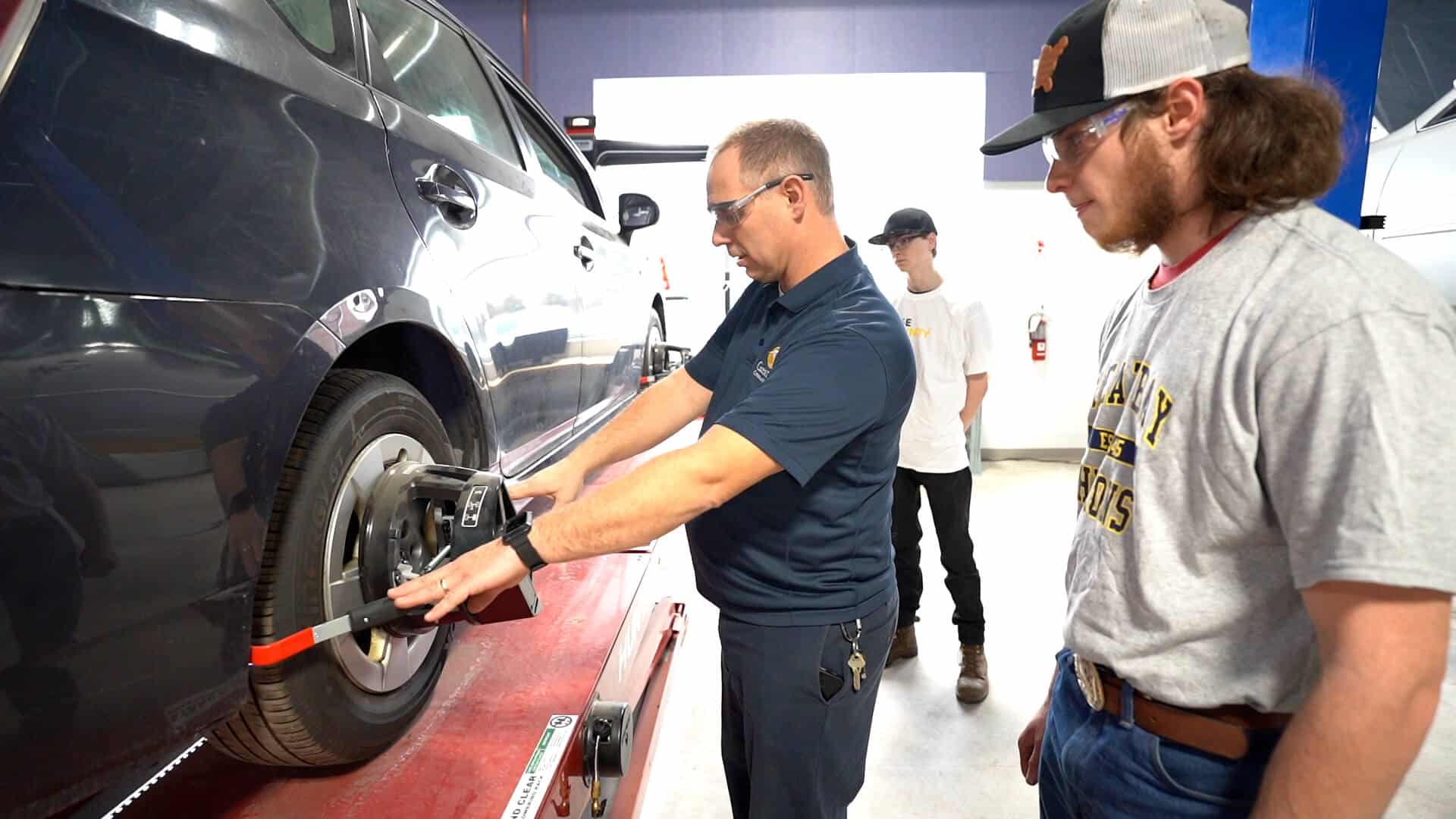Overview
The Automotive Technology Certificate provides students with skills and knowledge required for entry-level technicians performing inspection, diagnostics, maintenance, and repair on automobiles and light trucks. Students use investigative skills as they learn to locate problems, use a variety of power tools as well as hand tools and diagnostic tools as they work on parts, and work with technical reference materials. Applied math and computer skills are incorporated throughout the curriculum.
Completion of the certificate prepares students for Student Certification ASE exams in some areas and entry-level employment in the field.
The Automotive Technology Certificate is offered at an off-premises location and can be completed in three semesters.
Why Great Bay?
- Classes start in the fall and successful students area career-ready in the summer.
- Classes are conveniently held three evenings per week.
- The Richard W. Creteau Regional Technology Center in Rochester, New Hampshire completed a total renovation in 2019.
- Applicants may qualify for advanced placement through a Credit for Prior Learning / Experiential Learning Assessment.
Potential Jobs
Graduates of the program can qualify for numerous careers in the field, including:
- Certified Technician
- Line Technician
- Performance Tuner
- Import Technician
- Parts Manager
- Service Manager
Curriculum Outline
Great Bay’s current curriculum for the Automotive Technology Certificate is listed below.
Information regarding available scholarships or financial aid is also provided below.
Fall Semester
| Course ID | Course | Theory | Lab | Credits |
|---|---|---|---|---|
| AUTO110G | Automotive Maintenance and Light Repair | 2 | 4 | 4 |
| AUTO125G | Automotive Electronics I | 3 | 3 | 4 |
| Total Credits | 8 | |||
Spring Semester
| Course ID | Course | Theory | Lab | Credits |
|---|---|---|---|---|
| AUTO120G | Automotive Engines (Mechanical) | 2 | 6 | 4 |
| AUTO130G | Automotive Electronics II | 2 | 4 | 4 |
| Total Credits | 8 | |||
Summer Semester
| Course ID | Course | Theory | Lab | Credits |
|---|---|---|---|---|
| AUTO140G | Braking Systems | 2 | 4 | 4 |
| AUTO150G | Suspension and Steering | 2 | 6 | 4 |
| Total Credits | 8 | |||
Total Overall Credits: 24
Scholarships
There are scholarships available to students through the New Hampshire Automotive Education Foundation. Students will also get connected with jobs in the industry that will not only help them gain hands-on experience that coincides with course instruction, but there may be tuition assistance available through their employer under NHADA-sponsored grants.
Program Requirements
Admission Requirements
- Complete an application for the program.
- Provide proof of high school completion or equivalent.
- Provide an official copy of prior college transcripts, if appropriate.
- Must possess a valid driver’s license.
Health and Safety Considerations
This program includes work in an automotive lab where potentially hazardous equipment and materials are used. Students will be taught industry standards for safety and will be expected to follow all safety procedures. Personal protective equipment must be worn. Students will provide their own safety glasses, and boots or shoes.
Technical Requirements
This program includes work in an automotive lab and requires participants to physically perform functions that require the following:
- Normal vision for reading instructions and for performing tasks, including inspecting parts for quality (corrective vision is acceptable).
- Mobility and strength for performing tasks that require reaching, walking, standing, and safely lifting up to 20 lbs.
- Ability to hear sounds of equipment, for equipment operation and safety.
Required Tool List
Anticipated Cost: $1,800 to $2,400
Tools are to be provided by the student and are not included in tuition or fees. Your instructor will discuss student-only discounts available from various vendors. Tools and tool storage are required no later than the 3rd week of class. Required tools list is subject to change.
Wrenches:
Pliers:
Hammers:
Test Equipment:
Ratchets and Sockets:
Screwdrivers:
Other:
|
Program Outcomes
The goal of the Automotive Technician program is to prepare the student to work in the increasingly sophisticated and complex field of automotive technology through a combination of classroom instruction and hands on skill development.
Technicians must be able to work with electronic diagnostic equipment, read and understand technical manuals, investigate to find the cause of a problem, and connect effectively with the customer. They use a variety of tools, including both manual and high tech equipment to perform repairs.
After successful completion of the program, students will be able to:
• Demonstrate skills and knowledge required for passing the Student Certification ASE exams, including inspection, diagnostics, maintenance and repair of vehicles;
• Demonstrate safe and appropriate use and care of tools and equipment in the automotive lab;
• Diagnose, repair and document automotive systems including electrical, brakes, engines, suspensions, and steering;
• Inspect a vehicle, use a diagnostic approach to determine cause of operating problems, and decide action to take; Complete a NH State Vehicle Inspection;
• Compare and contrast alternate actions to determine whether to repair or replace a part;
• Use appropriate software for information retrieval, analysis, and reporting;
• Communicate effectively with coworkers and customers
Transfer Credit Policy
Students may transfer to either LRCC or MCC to complete an Associate Degree in Automotive Technology where advanced automotive technology courses are offered.




